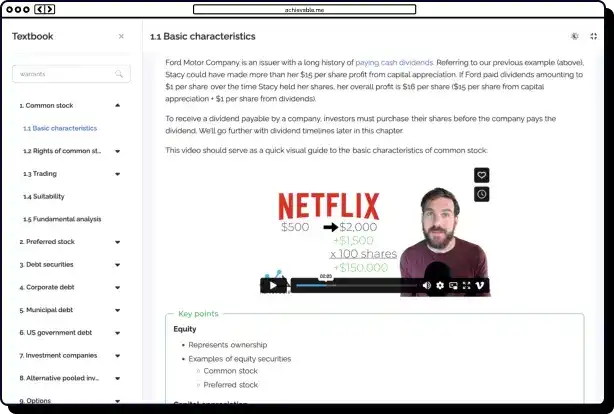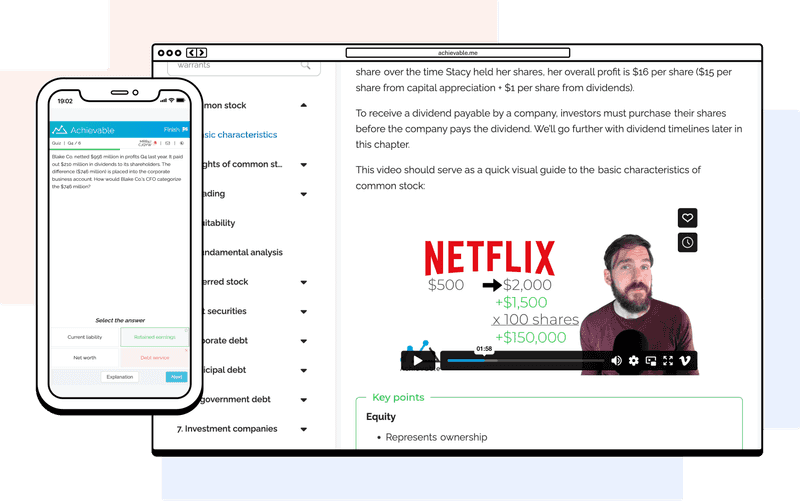General Securities Representative Exam (FINRA Series 7)
The Series 7 exam — the General Securities Representative Qualification Examination (GS) — assesses the competency of an entry-level registered representative to perform their job as a general securities representative.
Also referred to as the Series 7 "Top-Off" Exam. This exam must be passed in conjunction with the Securities Industry Essentials (SIE) Exam in order for the candidate to receive a full General Securities license from FINRA. You must be sponsored by a FINRA member firm in order to take the Series 7.
Question 1
In an account, an investor is short 1 MU Jul $75 put when the market is at $87. They want to create a bear put spread. Which of the following options should you recommend?
A.
Long 1 MU Jul $55 put
B.
Short 1 MU Jul $75 call
C.
Long 1 MU Jul $95 put
D.
Short 1 MU Jul $95 call
Question 2
Which of the following statements is FALSE regarding a variable annuity?
A.
It is subject to registration under the Securities Act of 1933
B.
The investor's assets are held in the insurance company's general account
C.
Payouts are determined by investment performance in the distribution phase
D.
An investor may make unlimited contributions in the accumulation phase
Question 3
A customer of yours manages a custodian account held at your firm and is attempting to determine their trading ability within the account. Which of the following trades is not prohibited in this type of account?
A.
Selling short a stock on the decline
B.
Large-cap value ETF bought on margin
C.
Short uncovered put
D.
Leveraged ETF
Question 4
A registered representative analyzes a growth stock to determine if it could be recommended to her clients. After a thorough examination, she determines the volatility of the security and the company's high debt levels make the investment unsuitable for all of her clients. What statement is true?
A.
The representative followed FINRA's reasonable-basis suitability guideline
B.
The representative followed FINRA's qualitative suitability guideline
C.
This is frontrunning, which is an unethical action
D.
This is a blanket recommendation, which is an unethical action
Question 5
A 60 year old customer of yours receives a $20,000 check from an IRA another broker-dealer, intending to rollover the funds to an IRA at your firm. Due to health-related issues, the rollover takes 66 days. If the customer is at the 32% tax bracket, what is their tax liability?
A.
$0
B.
$5,900
C.
$6,400
D.
$8,400
Question 6
A representative meets with a customer. After discussing some aspects of their account, the customer submits an unsolicited trade to buy common stock. The representative executes the trade and the meeting ends. Later that day, the customer discovers the representative's father is the CEO of the company they bought stock in. According to Regulation BI, which of the following statements is true?
A.
The representative acted ethically if the family relationship was public knowledge
B.
The representative acted unethically by not gaining principal approval prior to the trade
C.
The representative acted unethically by not making proper disclosures
D.
The representative acted ethically and no disclosure was required
Question 7
An investor purchases 400 shares of XYZ stock at $200, paying a $1 per share commission. After several months of ownership, XYZ Co. performs a 25% stock dividend. What is the adjusted cost basis for the investor?
A.
320 shares at $250.00 per share
B.
320 shares at $251.25 per share
C.
500 shares at $160.00 per share
D.
500 shares at $160.80 per share
Question 8
A customer of your firm goes short 1 TUV Jan 45 call at $8 when the market price is $49. Several months later the market goes to $65 and the option is closed at intrinsic value. What is the tax consequence?
A.
$1,000 capital gain
B.
$1,200 capital loss
C.
$1,300 capital gain
D.
$1,600 capital gain
Question 9
An investor purchases a 10 year, $1,000 par, 6% Treasury bond for 90. At the end of 9 years, the investor sells the bond at 98. If they do not accrete the bond, what are the tax consequences that year?
A.
$70 taxable interest; $10 capital gain
B.
$150 taxable interest; $10 capital loss
C.
$155 taxable interest; $25 capital loss
D.
$170 taxable interest; $15 capital gain
Question 10
An investor's portfolio allocation is:
- 35% small cap growth funds
- 10% large cap growth funds
- 20% sector funds
- 20% emerging market funds
- 10% speculative grade corporate bonds
- 5% money markets
What investment objective does this portfolio align closest to?
A.
Speculation
B.
High yield income
C.
Capital appreciation
D.
Aggressive growth
Achievable Series 7 - $199
Pass the FINRA Series 7 on your first try with Achievable's interactive, online exam preparation course. Includes everything you need: easy-to-understand online textbook, 2,000+ review quizzes, and 35+ full-length practice exams.
Easy-to-understand online textbook
3.7k+ chapter quizzes
35+ practice exams
39+ bonus videos

FINRA's Series 7 exam summary
Seeks Business for the Broker-Dealer from Customers and Potential Customers
7%
9 questions
The basics of customer-facing sales activities related to a general securities representative role. What you need to know and do when describing investment products and services to customers with the intent of obtaining their business.
Opens Accounts after Obtaining and Evaluating Customers' Financial Profile and Investment Objectives
9%
11 questions
The rules and processes you must follow when opening a customer account and informing them of their options. Also includes the requirements to make reasonable efforts to obtain customer profile information and report anything suspicious.
Provides Customers with Information about Investments, Makes Suitable Recommendations, Transfers Assets and Maintains Appropriate Records
73%
91 questions
The heart of the exam. Covers how you must provide customers with information about their investment options, especially the suitability of investments for them given their profile and goals. This requires being fluent in the risks, benefits, and typical investors of major financial products.
Obtains and Verifies Customers' Purchase and Sales Instructions and Agreements; Processes, Completes, and Confirms Transactions
11%
14 questions
The logistics portion, covering how to obtain quotes, execute orders, and how to enlist your supervisor to assist in the resolution of discrepancies, disputes, and errors.

Pass the FINRA Series 7. Guaranteed.
Achievable is the best online exam prep course: effective, personalized, and convenient. With Achievable, you'll spend less time studying and pass your exam the first time, or your money back.